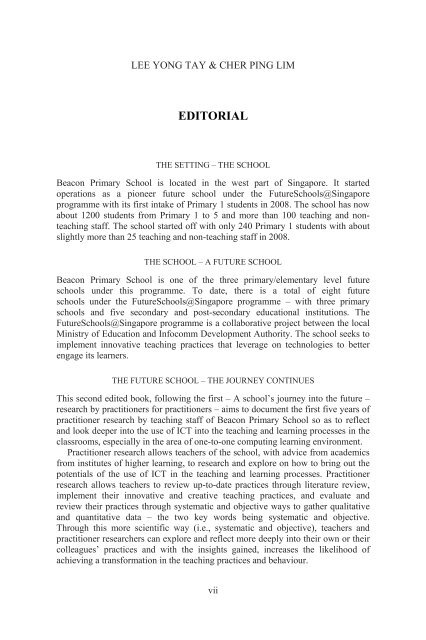1517-creating-holistic-technology-enhanced-learning-experiences
1517-creating-holistic-technology-enhanced-learning-experiences
1517-creating-holistic-technology-enhanced-learning-experiences
Create successful ePaper yourself
Turn your PDF publications into a flip-book with our unique Google optimized e-Paper software.
LEE YONG TAY & CHER PING LIM<br />
EDITORIAL<br />
THE SETTING – THE SCHOOL<br />
Beacon Primary School is located in the west part of Singapore. It started<br />
operations as a pioneer future school under the FutureSchools@Singapore<br />
programme with its first intake of Primary 1 students in 2008. The school has now<br />
about 1200 students from Primary 1 to 5 and more than 100 teaching and nonteaching<br />
staff. The school started off with only 240 Primary 1 students with about<br />
slightly more than 25 teaching and non-teaching staff in 2008.<br />
THE SCHOOL – A FUTURE SCHOOL<br />
Beacon Primary School is one of the three primary/elementary level future<br />
schools under this programme. To date, there is a total of eight future<br />
schools under the FutureSchools@Singapore programme – with three primary<br />
schools and five secondary and post-secondary educational institutions. The<br />
FutureSchools@Singapore programme is a collaborative project between the local<br />
Ministry of Education and Infocomm Development Authority. The school seeks to<br />
implement innovative teaching practices that leverage on technologies to better<br />
engage its learners.<br />
THE FUTURE SCHOOL – THE JOURNEY CONTINUES<br />
This second edited book, following the first – A school’s journey into the future –<br />
research by practitioners for practitioners – aims to document the first five years of<br />
practitioner research by teaching staff of Beacon Primary School so as to reflect<br />
and look deeper into the use of ICT into the teaching and <strong>learning</strong> processes in the<br />
classrooms, especially in the area of one-to-one computing <strong>learning</strong> environment.<br />
Practitioner research allows teachers of the school, with advice from academics<br />
from institutes of higher <strong>learning</strong>, to research and explore on how to bring out the<br />
potentials of the use of ICT in the teaching and <strong>learning</strong> processes. Practitioner<br />
research allows teachers to review up-to-date practices through literature review,<br />
implement their innovative and creative teaching practices, and evaluate and<br />
review their practices through systematic and objective ways to gather qualitative<br />
and quantitative data – the two key words being systematic and objective.<br />
Through this more scientific way (i.e., systematic and objective), teachers and<br />
practitioner researchers can explore and reflect more deeply into their own or their<br />
colleagues’ practices and with the insights gained, increases the likelihood of<br />
achieving a transformation in the teaching practices and behaviour.<br />
vii


